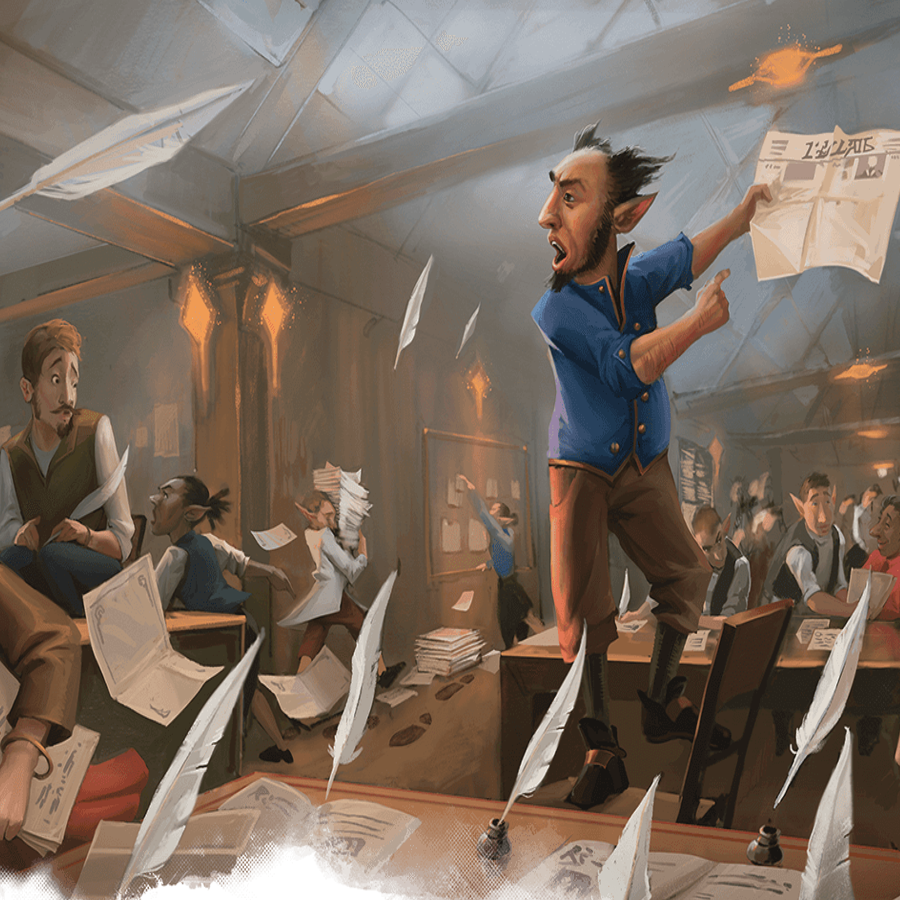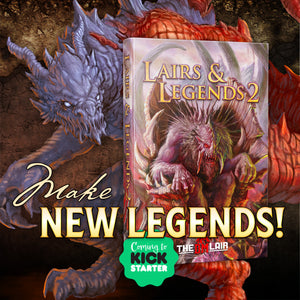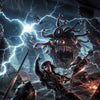Don’t Believe These 15 Dungeon Master Myths

Written by Luke Hart
There is a plethora of myths floating around out there about game masters. “A game master should never do this . . .” “A GM should always . . .” However, most of it is just a bunch of bullcrap. So, today, we’ll go over the top 15 dungeon master myths and why you shouldn’t believe them.
Watch or listen to this article by clicking the video below.
Myths
#1 A game master should have a fully realized and prepared game world for the players to explore before the campaign begins.
Yeah, right. Let me give you a quick idea of what that would mean and everything a DM would have to prepare. Even using a premade setting, you have to read, learn, and study—it’s just too much to expect a DM to be able to do all of that. Thinking you must be completely ready for anything in a tabletop roleplaying game just means the game will never actually start.
#2 A game master has to be a player first.
When I started, I had never played before; I jumped right in as a DM. Many great GMs have never played or didn’t play until they had been running the game for years. Being a player can make you a better GM, but it isn’t guaranteed. You could be a player in a game with a horrible game master and learn the wrong things, actually making you worse.
If you’ve never played, there is a plethora of gameplay out there to watch; it will give you an idea about how games go. However, bear in mind that watching a game doesn’t show you what is happening behind the screen—what the DM is doing. Make sure you are watching an “actual play,” too—folks just playing the game, not a show where their first goal is to entertain viewers. There are tons of resources out there for learning how to GM. The best way to learn is by doing.
#3 A game master should never let the players in on their plans.
While a player should never be completely spoiled on an adventure or plot element, sometimes, collaborating with a player on an idea or element of the plot can have some upsides. It can give the GM new ideas or a new perspective, increase player investment and buy-in, and help a quiet or hesitant player become more involved in the adventure when it’s finally played. I do this sparingly, though I suspect some GMs do it quite often.
#4 A game master must know all the rules, including player character abilities.
You will probably never learn all the rules in the Pathfinder 2 or D&D books. If you can and do know them all, we need to get you a medal.
The truth is, just do the best you can. Read the rules and brush up on them before games—I used to lie down before every D&D game and read bits from the PHB or DMG for 30 minutes to an hour.
Remember, you will learn the rules best when you use them in your games. Just make sure you are actually using them. I’ve been in and seen games that barely even use the rules; they just make everything up on the spot.
The players should be responsible for knowing the rules that govern their characters—spells, abilities, and so on. However, the GM should be familiar with them.
It’s OK for a GM to reference the rules during the game, make quick rulings, or even invent things on the fly as needed.
#5 A good game master is an impartial adjudicator of the rules who should never fudge or adjust in the players’ favor.
While many (including me) believe that dice fudging is generally bad, it’s OK for a GM to adjust hit points, how much damage a creature does, and so on.
I do this mostly if I make a mistake in my planning and either 1) place the characters against a challenge beyond their capability or 2) give them a challenge so underwhelming they will be disappointed. Some people consider GMs doing things like this to be cheating. If you’re interested in that topic, I have a video titled “7 ways dungeon masters SUPPOSEDLY cheat in D&D” if you’d like to learn more.
#6 The game master needs to buy everything.
I’m not sure if this is an “official” myth, but it is a de facto one. I often see and hear that GMs buy everything their groups need—books, dice, maps, and others—and players just freeload. And when I push back on this and tell GMs that their players should chip in, especially if it’s something the player would be using, the game master tells me something like, “Well, my players just wouldn’t buy it, and then we wouldn’t be able to play.” And that’s just messed up and unfair. Everyone should contribute to the extent they are able. Everything should not fall on the GM’s shoulders.
#7 It’s the game master’s responsibility to ensure that the players have fun.
No, no, no, no!
You cannot control for player preference. Even the best game master will have some players who just don’t like their games. I’m sure I’ve had players leave my games because they weren’t having fun. No GM is immune to this.
Furthermore, the GM supplies the adventures, world, and NPCs, but the players must contribute to the game to get anything out of it. “You get out of the game what you put into the game.”
The GM can only create the environment where fun might be had; they cannot force players to have fun.
#8 A game master is a storyteller.
I have an article for new GMs that goes over this myth, as well as a video that debunks it, so I’ll keep this rant brief.
The GM creates the situation, the scenario, and the adventure—how the players’ characters interact with that situation creates the story. In tabletop RPGs, the story is the confluence of the game master’s world and adventures and the players’ actions in that world and the adventures.
#9 A good DM never says “no.”
This is also known as the “yes, and . . .” improv philosophy; however, RPGs are not improvisations. They have improvisation in them and thus integrate elements of improv, but the “yes, and . . .” philosophy of improv applies to improv itself when it’s used in the game.
To think that a DM can never say “no” is ridiculous. Sometimes, players want to do things that directly conflict with game rules or the reality of the world in which their characters live.
Most times, a GM should use “yes, but . . .” instead of saying “no.” However, there are times when a GM (or a player for that sake) needs to say “no.”
#10 A game master has to be a performer.
By saying this, folks are trying to state that a GM needs to be a master actor, singer, voice actor, narrator, and so on to run a good game. And that’s just silly. Very few people in the world are any of these things; if those were the requirements to be a good game master, there would be very few good GMs out there.
Will these things help? Probably. Are they required? No, absolutely not. You focus on being the best game master you can be, using your skills and talents, and let everyone who tells you otherwise go sit on a parking cone.
#11 The game master is in competition with the player and should try to “win.”
The GM is not there to win, whatever that means. The monsters that the GM controls will lose 99% of the time and most RPGs are designed that way.
The players are there to have their characters win over the bad guys, but the GM’s goal is not to help the bad guys win. The GM is not the players’ enemy. The GM has a different role in the game than the players. They are there to create conflict and present challenges, but at the same time, the GM should be the players’ greatest cheerleader. Although it may appear that they are trying to have their bad guys defeat the players’ characters, the GM should be rooting for their players’ characters to win.
The bottom line is the GM is not there to be the players’ enemy.
#12 The GM can do anything they want.
While this is technically true, you should consider the natural ramifications if you implement this without reasonable boundaries. I mean, you can do anything as the GM, but that doesn’t mean your players will stick around to witness it. At its heart, this is a group game, and when the GM does things the players don’t enjoy or agree with, the quality of the game will suffer, and your players may walk and find a different GM.
#13 The game master can change the rules at any time.
This is another “technically true” one. Yes, the GM can alter the rules, but if you don’t have player buy-in and agreement on the changes, you’ll likely find yourself with some upset players.
Furthermore, changing the rules should not be done on the fly. Instead, it should be carefully considered and discussed with your players. Again, ideally, we’re looking for agreement on the changes from everyone at the table. Sure, this isn’t always possible, but it’s preferred.
Now, the GM can make exceptions to the rules on the spot for specific circumstances, but they really shouldn’t make long-term changes to the rules without informing the players in advance. . .
Finally, any rule changes should be made to enhance the game, not penalize the players or GM or put anyone at a deliberate disadvantage.
#14 You should be more like Matt Mercer, Brennan Lee Mulligan, or any other famous game master.
It’s simply a lie that one game master needs to be like another. Every GM is different, and no GM should be compared to another GM or told that they must do something another GM does. Players can make suggestions, of course, but no GM should be forced or even encouraged to try to be like someone else.
Now, can you learn from other GMs? Yes, absolutely. However, you have your own unique personality and style. Don’t let anyone measure you by an erroneously established standard.
#15 A game master is a therapist.
There is a belief spreading through the TTRPG community these days that players should create characters that help them explore their own psychology and problems—that TTRPGs are therapy, and it is part of the GM’s job to facilitate that.
I don’t know about you, but I am not a licensed therapist. If one of my players needs therapy, I would suggest they see a professional. It is a poor expectation to think that my game will give them the help they need.
Now, might our tabletop RPG be helpful for them? Sure. Many people gain amazing benefits from playing D&D with their friends.
However, it is not a game master’s responsibility to render professional help; we’re there to run a game, not provide therapy. Furthermore, never feel bad if you have to ask a player to leave your group because of their poor behavior. It is not your responsibility to play doctor or parent, even if some folks might try to guilt trip you into doing it. If a person needs therapy, they should be seeing a therapist, not their game master.
What’s the Deal with All the Missing Rules for 5e?
Are you frustrated that there are some big gaps in the 5e core game system? Sometimes it seems like entire rulesets seem to be missing!
Believe me, we feel your pain. That’s why, in the Big Ruleset Bundle, we have created several lightweight rulesets to fill in the gaps in the game:
- Mass Combat
- Sieges
- Hexcrawls
- Points of Interest
- Advanced Poison
- Hexes
- Curses
- Crafting
- And more
Remember, these rules are lightweight, meaning it won’t take you and your players ages to read and learn them!
So, if you’re tired of having to homebrew your own rules or make on-the-spot adjudications when these situations arise, pick up the Big Ruleset Bundle. Don’t spend another second wondering why it isn’t in the core rulebook.
Also, if you’re looking for information on running Skill Challenges in 5e—another mechanic oddly missing from the game—check out our article on How to Run Skill Challenges in D&D 5e.
-
Posted in
Game Master How-To Articles







